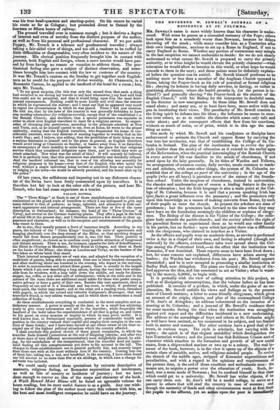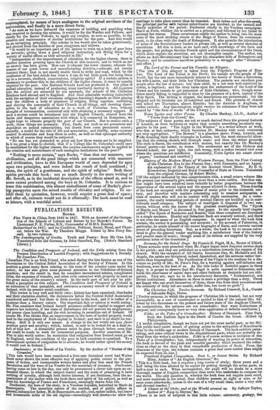THE REVEREND W. SEWELL'S JOURNAL OF A RESIDENCE AT ST.
COLUMBA.
Ma. SzwELL's name is more widely known than his character is under- stood. With some he passes as a concealed emissary of the Pope; others look upon him as a somebody worse than Newman, because he delays throwing off the mask ; while many consider him as a Tractarian after their own imaginations, anxious to set up a Rome in England, if not to carry England to Rome. Whether any portion of correctness may mingle in the last suspicion we cannot undertake to decide: for we do not clearly understand to what extent Mr. Sewell is prepared to carry the priestly authority, or to what height he would elevate the priestly character—what toleration he would allow to heretics in this world, or what hope he would concede to them in the next ; and these points must be definitely explain- ed before the question can be settled. Mr. Sewell himself professes to be nothing more or less than a member of the Anglican Church opposed to Rome, taking the Prayer-book as his rule of practical or formal religious life; obeying its behests in having daily services, in fasting, or rather in practising abstinence, where the health permits it, (or the person is in- clined ?) and generally obeying " the Prayer-book as the statute of the English Church," with his Bishop for the interpreter in doubtful cases, or the director in new emergencies. In these ideas Mr. Sewell does not stand alone ; and many are, or at least have been, more active with the pen in inculcating their views. The peculiarity of Mr. Sewell consists in the living spirit he infuses into his ideas ; the influence be seems to exer- cise over others, so as to realize the theories which some only talk and write about; and the consequent effects that flow from his exertions, without so much of noise, or of print, which is in this age the same thing as noise.
One mode by which Mr. Sewell and his coadjutors or disciples have endeavoured to animate the Church and oppose Rome by carrying the war into her territories, was that of establishing the College of St. Co- lumba in Ireland. The plan of the institution was to revive the prin- ciple (rather than the mode) of education as it existed in the earlier ages of the Reformation, when the practical intermingling of the Romish Church in every action of life was familiar to the minds of churchmen, if not acted upon by the laity generally. In its titles of Warden and Fellows, its arrangement of common rooms, daily service, meals common to teach- ers and scholars, with some other things, the system of St. Columba re- sembled that of the college as part of the university ; in the age of the pupils (who are all boys) it partakes more of the nature of the founda- tion school. Under the auspices of churchmen, trained in universities, the classics and mathematics are of course a leading feature in the sys- tem of education ; but the Irish language is also a main point at the Col- lege of St. Columba, because it is said that a person speaking Irish has ipso facto a great influence over the peasantry ; and the promoters rely upon this knowledge as a means of making converts from Rome, by such of their pupils as enter the church. At present the scholars are sons of gentlemen ; but the promoters look forward to the time when they may have boys on the foundation seemingly the children or orphans of clergy- men. The Bishop of the diocese is the Visiter of the College ; the colle- giate body attends the parish-church ; and the society admits the right of the parochial Rector to superintend them as he would any other family in bis parish, but no further : upon which last point there was a difference with the clergyman, who claimed to interfere as a Visiter.
As the officers and pupils wear an academic dress, as service is performed twice a day in a chapel of their own, and fasting is adopted (though not enforced) by the officers, extraordinary tales were spread about the. Col- lege among the Protestant Irish,—to the effect that the institution was Romanist, if not Jesuitical. These reports seem to have been lived down ; but, for some reasons not explained, differences have arisen among the leaders : the Warden has withdrawn from his post ; Mr. Sewell appears dissatisfied ; and he is now occupied in promoting a similar institution at Radley Hall, near Abingdon. The plans are formed ; the Bishop of Ox- ford approves the idea, and has consented to act as Visiter; what is want- ing is the money, 6,0001., to begin with.
It is probably with the view of calling attention to this project, as well as of dissipating misconceptions, that the volume before us has been published. It consists of a preface, in which, under the guise of an ex- planation, Mr. Sewell unfolds his views and feelings as to the present state of Church matters; a letter to some friendly clergyman, which gives an account of the origin, objects, and plan of the contemplated College of St. Ann's at Abingdon ; an address volunteered on the occasion of a meeting at St. Columba; and a journal of Mr. Sewell's residence there for some months during the time when the institution was struggling against evil report and the difficulties incidental to a new undertaking. The address to the assemblage of boys and others at St. Columba might as well have been omitted, as too occasional in its subject, and too limited both in matter and manner. The other sections have a good deal of in- terest, in various ways. The style is scholarly, but varying with its topics ; the spirit is of that elegant amiability which distinguishes the best Tractarian writers ; and the journal has that Robinson Crusoe sort of character which attaches to the formation and growth of all new social states, from a shipwrecked mariner or two up to a colony. The real in- terest of the book, however, is in the view it opens up of the objects of a certain class of amiable, active, and religious-minded people. To revive the church of the middle ages, stripped of Romanist superstitions and peculiarities, and with a regard to the opinions and requirements of
the present time, is the end of those excellent and enthusiastic men: the means are, to acquire a power over the education of youth. Such, in- deed, was a main mode of Newman ; but he confined himself to that class
which could get to a university. Mr. Sewell has wider objects, if be can carry them out. St. Ann's will be, a model college, to serve as a parent to others that will stud the country in case of success ; and though the necessity of funds and other circumstances must at first limit the pupils to the affluent, yet an action upon the poor is immediately
contemplated, by means of boys analogous to the original servitors of the universities, and finally in a more direct form.
"As soon as we have defrayed the expenses of building and providing what was required to develop the system, it would be for the Warden and Fellows, and chiefly for the Senior Fellows, to apply any surplus, as soon as possible, to the creation and maintenance of similar institutions for the poor. And this would be an unvarying principle. One scholar in ten would also be taken gratuitously, and elected from the families of poor clergymen and widows.
"It would be an important part of the system to train up a body of poor boys as servants; giving them a good religions instruction, and fitting them for a variety of useful offices as they advanced in life." • • •
a Independent of the improvement of education for the higher classes, there is another question pressing upon the Church at this moment, and to which as yet no answer has been given. How can it educate the lower classes; educate the masses of our great towns and manufacturing districts,—educate, not merely instruct them; that is, not merely enable them to write and read, which by the confession of the best minds has done a d can do but little good, but bring them up in a reverent, obedient, conscientious, religious spirit? If a certain system is necessary to produce this in the children of the higher classes, it must be equally required for the poor. Oar National Schools have not produced it. Our plans of nutted education, instead of producing, must inevitably destroy it. All inquirers into the subject are attracted by one spectacle, the schools of the Christian Brothers both abroad and in England. And their admirable working (admirable with the exception of their erroneous religious teaching) depends on their placing over the children a body of ministers of religion, hying together, exhibiting and obeying the commands of their Church in all things, and devoting them- selves to the task of education as to a work of Christian love, without thought of remuneration, contented only with obtaining a necessary support. If
i such a system could be introduced into the English Church, cleared from the faults and dangerous associations with which it is connected in Romanian), we might hope to educate properly the poor of our Church. But to realize such a work, three things are necessary. First, funds, not such as are precarious and dependent on annual subscriptions, but drawn from some permanent source; secondly, a model for the rule of life and association; and thirdly, some external control to stimulate and keep them in order, as well as that episcopal authority to which of course they would be subjected. " No one has yet pretended to point out how these wants are to be supplied. Is it too great a hope to cherish, that if a College like St. Colamba's could once be established for the higher classes, the surplus emoluments might be applied to the creation and maintenance of such analogous institutions for the poor?
"Nothing is more certain," says Burke, " than that our manners, our civilization, and all the good things which are connected with manners and civilization, have in this European world of ours depended for ages upon two principles, and were indeed the result of both combined ; I mean, the spirit of a gentleman, and the spirit of religion." Both these spirits pervade this book : not so much directly in the mere writing of Mr. Sewell, as in the incidental description of the effects aimed at, and to some extent produced, among the boys at St. Columba. It is carious to trace this combination, this almost embodiment of some of Burke's glow- ing panegyrics upon the mixed results of chivalry and religion. To ex- hibit them by quotation, however, would require a great deal of space; and after all, extracts would not do it effectually. The book must be read at leisure, with a watchful mind.



























 Previous page
Previous page